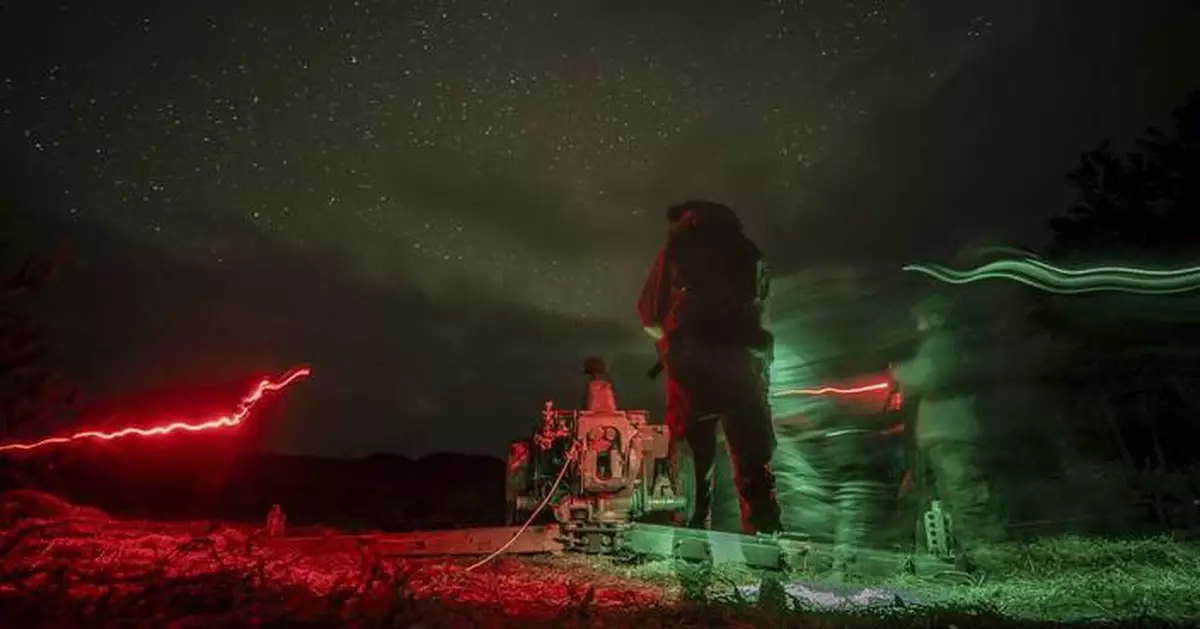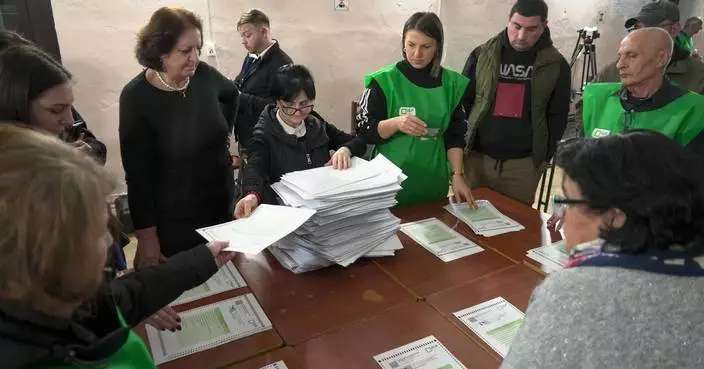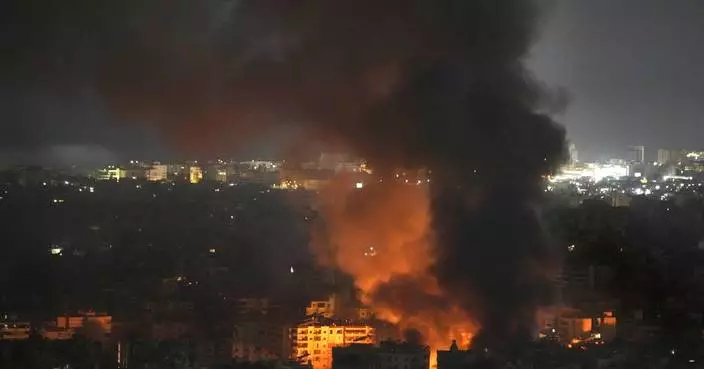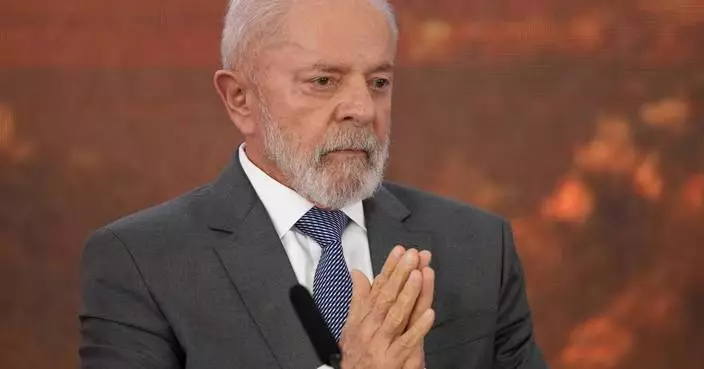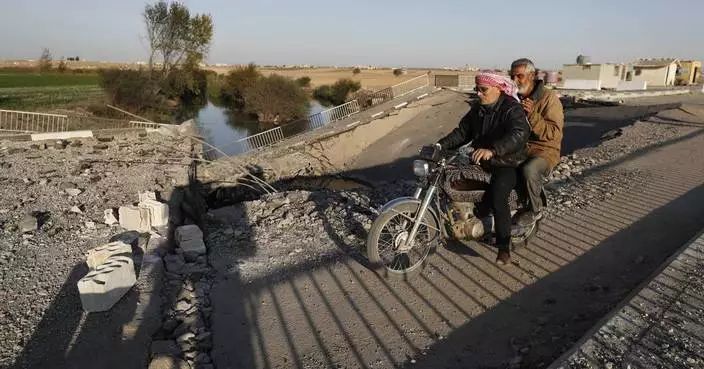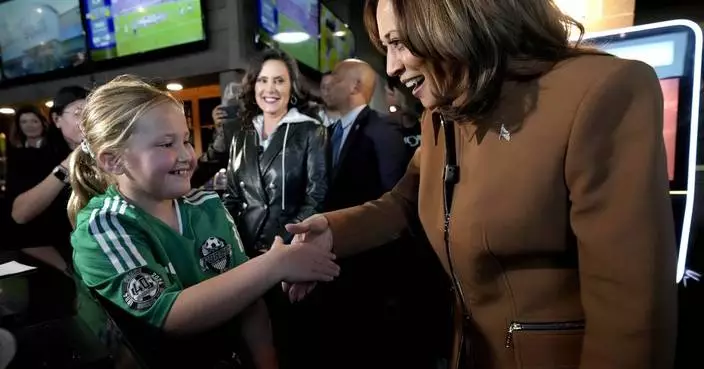KYIV, Ukraine (AP) — Russian forces thwarted an attempt at another cross-border incursion by Ukraine into southwestern Russia, a local official reported Sunday, months after Kyiv staged a bold assault on its nuclear-armed enemy that Moscow is still struggling to halt.
An “armed group” sought Sunday to breach the border between Ukraine and Russia’s Bryansk region, its governor, Aleksandr Bogomaz, said but was beaten back. Bogomaz did not clarify whether Ukrainian soldiers carried out the alleged attack, but claimed on Sunday evening that the situation was “stable and under control" by the Russian military.
There was no immediate acknowledgement or response from Ukrainian officials.
The region neighbors Kursk province, where Ukraine launched a surprise push on Aug. 6 that rattled the Kremlin and constituted the largest attack on Russia since World War II. Hundreds of Russian prisoners were blindfolded and ferried away in trucks in the opening moments of the lightning advance, and Ukraine’s battle-hardened units swiftly pressed on across hundreds of square miles (square kilometers) of territory.
Responsibility for previous incursions into Russia’s Belgorod and Bryansk regions has been claimed by two murky groups: the Russian Volunteer Corps and the Freedom of Russia Legion.
Russian officials and state media have sought to downplay the significance of Kyiv’s thunderous run in Kursk, but the country’s forces have so far been unable to dislodge Ukrainian troops from the province. Western officials have speculated that Moscow may send troops from North Korea to bolster its effort to do so, stoking the almost three-year war and bringing geopolitical consequences as far away as the Indo-Pacific region.
Russian lawmakers Thursday ratified a pact with Pyongyang envisioning mutual military assistance, a move that comes as the U.S. confirmed the deployment of 3,000 North Korean troops to Russia.
North Korean units were detected Wednesday in Kursk, according to Ukraine’s Main Intelligence Directorate, known by its acronym GUR. The soldiers had undergone several weeks of training at bases in eastern Russia and had been equipped with clothes for the upcoming winter, GUR said in a statement late Thursday. It did not provide evidence for its claims.
Also on Sunday, Russian President Vladimir Putin said Moscow is working on ways to respond if the U.S. and its NATO allies allow Ukraine to strike deep inside Russia with long-range Western missiles.
Putin told Russian state TV that it was too early to say exactly how Moscow might react, but the defense ministry has been mulling a range of options.
Russia has repeatedly signaled that it would view any such strikes as a major escalation. The Kremlin leader warned on Sept. 12 that Moscow would be “at war” with the U.S. and NATO states if they approve them, claiming military infrastructure and personnel from the bloc would have to be involved in targeting and firing the missiles.
He reinforced the message by announcing a new version of the nuclear doctrine that considers a conventional attack on Russia by a nonnuclear nation that is supported by a nuclear power to be a joint attack on his country — a clear warning to the U.S. and other allies of Kyiv.
Putin also declared the revised document envisages possible nuclear weapons use in case of a massive air attack, opening the door to a potential nuclear response to any aerial assault — an ambiguity intended to deter the West.
Ukrainian leaders have repeatedly said they need permission to strike weapons depots, airfields and military bases far from the border to motivate Russia to seek peace. In response, U.S. defense officials have argued that the missiles are limited in number, and that Ukraine is already using its own long-range drones to hit targets farther into Russia.
That capability was evidenced by a Ukrainian drone strike in mid-September that hit a large Russian military depot in a town 500 kilometers (300 miles) from the border.
The U.S. allows Kyiv to use American-provided weapons in more limited, cross-border strikes to counter attacks by Russian forces.
In a separate update, Bryansk Gov. Bogomaz claimed that over a dozen Ukrainian drones were shot down over the region on Sunday. Separately, a total of at least 16 drones were downed over other Russian regions, including the Tambov province some 450 kilometers (290 miles) north from the border, officials reported. There were no reports of casualties from any of the alleged attacks.
In Ukraine’s southern city of Kherson, Russian shelling killed three civilians on Sunday, local Gov. Oleksandr Prokudin claimed. Another Kherson resident died in a blaze sparked by shells hitting a high-rise, according to Ukraine’s Emergency Service.
Air raid sirens wailed for over three hours in Kyiv overnight into Sunday, and city authorities later reported that “around 10” drones had been shot down. They said no one had been hurt. Ukraine’s air force on Sunday reported that it had shot down 41 drones launched by Russia across Ukrainian territory.
Follow AP’s coverage of the war in Ukraine at https://apnews.com/hub/russia-ukraine
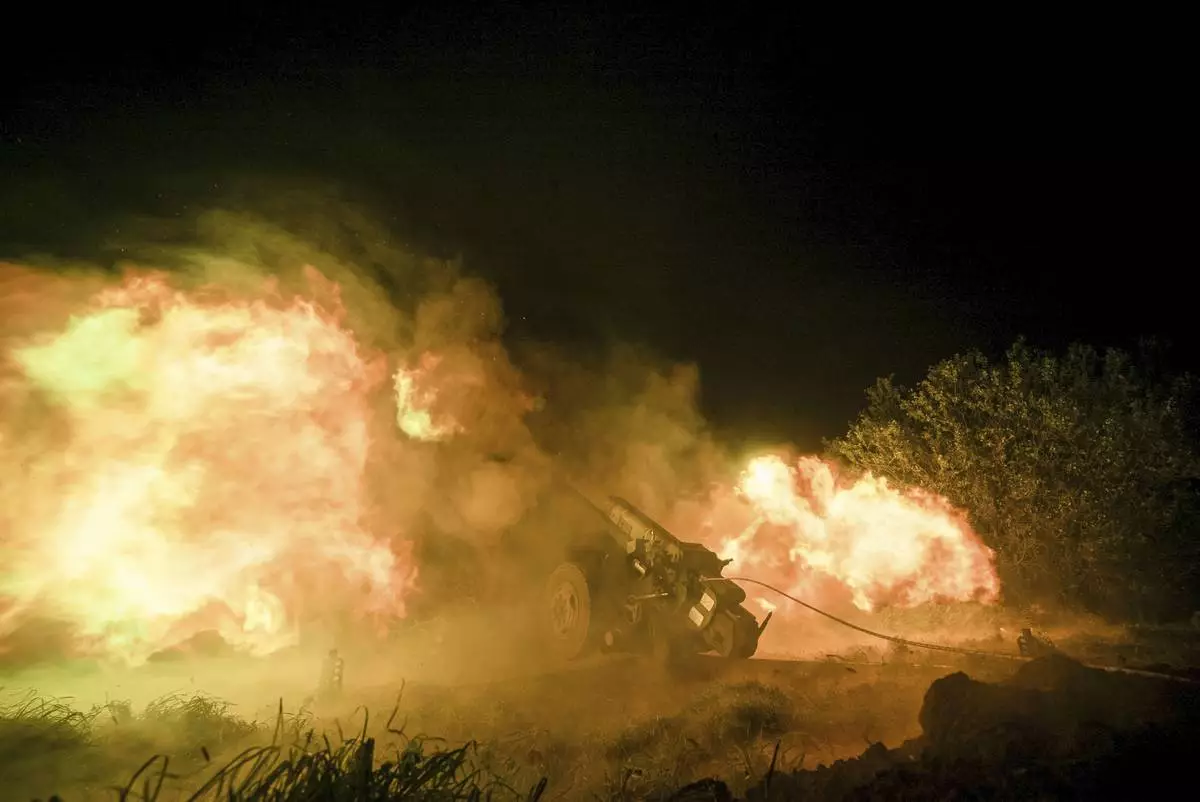
Ukrainian servicemen fire from a 122mm artillery cannon towards Russian positions in Kherson region, Ukraine, Sunday Oct. 27, 2024. (AP Photo/Marko Ivkov)
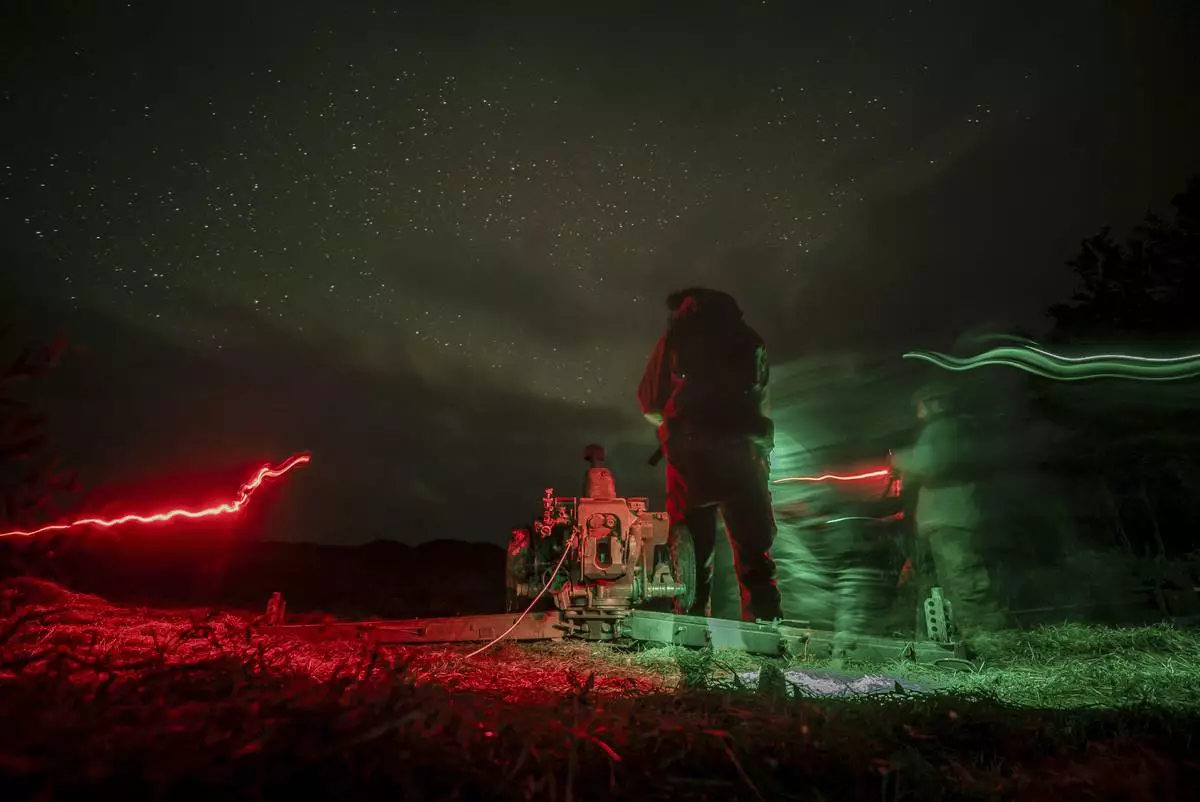
Ukrainian servicemen prepare 122mm artillery cannon before firing towards Russian positions in Kherson region, Ukraine, Sunday Oct. 27, 2024. (AP Photo/Marko Ivkov)
MONTEVIDEO, Uruguay (AP) — Voters in the small South American nation of Uruguay headed to the polls to choose a new president on Sunday in a race between two moderates that defies regional trends of bitter division and democratic erosion.
The contest between Uruguay's incumbent conservative coalition and its challenger, a center-left alliance, got underway with some 2.7 million eligible voters also casting ballots for Parliament and a contentious referendum on overhauling the social security system.
The pension vote — which would expand the fiscal deficit in one of Latin America’s wealthiest countries — has consumed more media attention in recent weeks than other top campaign issues, such as child poverty, education and security.
With the candidates in broad agreement over many issues, no one expects the outcome of the presidential vote to herald drastic change in this nation of 3.4 million people, long considered a model democracy and bastion of stability in the region.
“In a way, Uruguay has been boring, but boring in this sense is very good,” said Juan Cruz Díaz, a political analyst who runs the Cefeidas consultancy group in Buenos Aires. “We’ve seen so many dramatic changes in Argentina, Brazil, Ecuador, Colombia and suddenly we face elections in Uruguay in which there is a general consensus, there’s stability.”
While in neighboring Brazil and Argentina, voters recently vented their rage at the status quo, Uruguay's electorate remains largely satisfied with the government's business-friendly policies and the economy's steady growth. The current center-right president, Luis Lacalle Pou, enjoys a 50% approval rating.
The presidential campaigns have played out without the vitrolic insults and personal attacks seen elsewhere, such as the United States, Argentina or Brazil.
As constitutional term limits bar Lacalle Pou from running for a second consecutive term, the governing party's candidate is Álvaro Delgado, 55, a congressman and Lacalle Pou's former chief of staff, who started his career as a veterinarian.
“We voted with joy in a very special election, appreciating this democracy that makes us proud and Uruguay’s spirit of respect and tolerance,” Delgado posted on social media platform X after casting his ballot.
His main challenger is Yamandú Orsi, 57, a center-left former mayor and history teacher with humble roots from the Frente Amplio (or Broad Front) coalition, which governed from 2005-2020 before Lacalle Pou’s victory. The alliance oversaw the legalization of same-sex marriage. Uruguay became the first country to legalize cannabis for recreational use and developed one of the world's greenest grids, powered by 98% renewable energy.
The latest polls show Orsi in a comfortable lead at 44%, but not winning outright, which would send the country to a run-off on Nov. 24.
Orsi voted at a school in Canelones, the district of cattle and sheep ranches where he served twice as mayor some 50 kilometers (31 miles) from the country’s capital, Montevideo. Emerging from the polling station, he expressed pride in his country's enduring faith in democracy, restored in 1984 after a 12-year dictatorship.
“Uruguay has had the happiness for 40 uninterrupted years ... the happiness that our citizens can elect their leaders,” Orsi said. “In today’s world, it is a beautiful privilege.”
Orsi has benefited from the support of popular former President José “Pepe” Mujica, the eccentric former guerrilla who helped spearhead Uruguay's transformation into the continent's most socially liberal country during his 2010-2015 presidency.
Now 89, Mujica is battling esophageal cancer, but he still managed to cast his ballot in Montevideo, the capital, on Sunday. Arriving to vote in a wheelchair, he was quickly swarmed by reporters.
“We need to support democracy, not because it is perfect, but because humans have not yet invented anything better,” he told journalists after exiting the polling station.
Like Mujica, who lives in a modest farmhouse on the outskirts of Montevideo, Orsi says he wouldn't live in the presidential palace if elected.
In a distant third is Andrés Ojeda, 40, a muscular and media-savvy lawyer who has tried to energize apathetic young voters with splashy campaign videos showing him lifting weights at the gym and describing himself as a classic Capricorn.
He told The Associated Press that his unconventional style draws inspiration from other charismatic “leaders of the new politics” in Latin America wielding social media to amass fans, like El Salvador's populist Nayib Bukele and Argentina's radical libertarian Javier Milei. But he backs the ruling coalition and promises no radical change.
The electoral contest has largely focused on the rise in homicides and robberies, with the governing coalition advocating a tough-on-crime approach and the liberal coalition seeking to increase the state's role in security matters.
Voters are also concerned about the one in five Uruguayan children living in poverty and the low rate of high school graduations.
But the overlap between political platforms has left much of the Uruguayan electorate indifferent.
“It was a presidential campaign far removed from the people that did not achieve the levels of engagement that Uruguay historically has,” said Montevideo-based political analyst Julián Kanarek.
More divisive than the presidential race is the constitutional referendum that would overhaul Uruguay's social security system.
If approved by more than 50% of voters, the $23 billion scheme backed by the country's powerful unions would lower the retirement age, boost payouts and transfer Uruguayans' privately managed savings to a government-run trust.
Both leading candidates have spoken out against the proposal, which has already sent tremors through global markets. Shrugging off the fiscal consequences, supporters say it would redistribute Uruguay’s resources more fairly.
There is also a referendum on allowing nighttime police raids on homes.
Uruguayans are not obliged to vote in the plebiscites, but voting in the congressional and presidential races is compulsory.
DeBre reported from Buenos Aires, Argentina
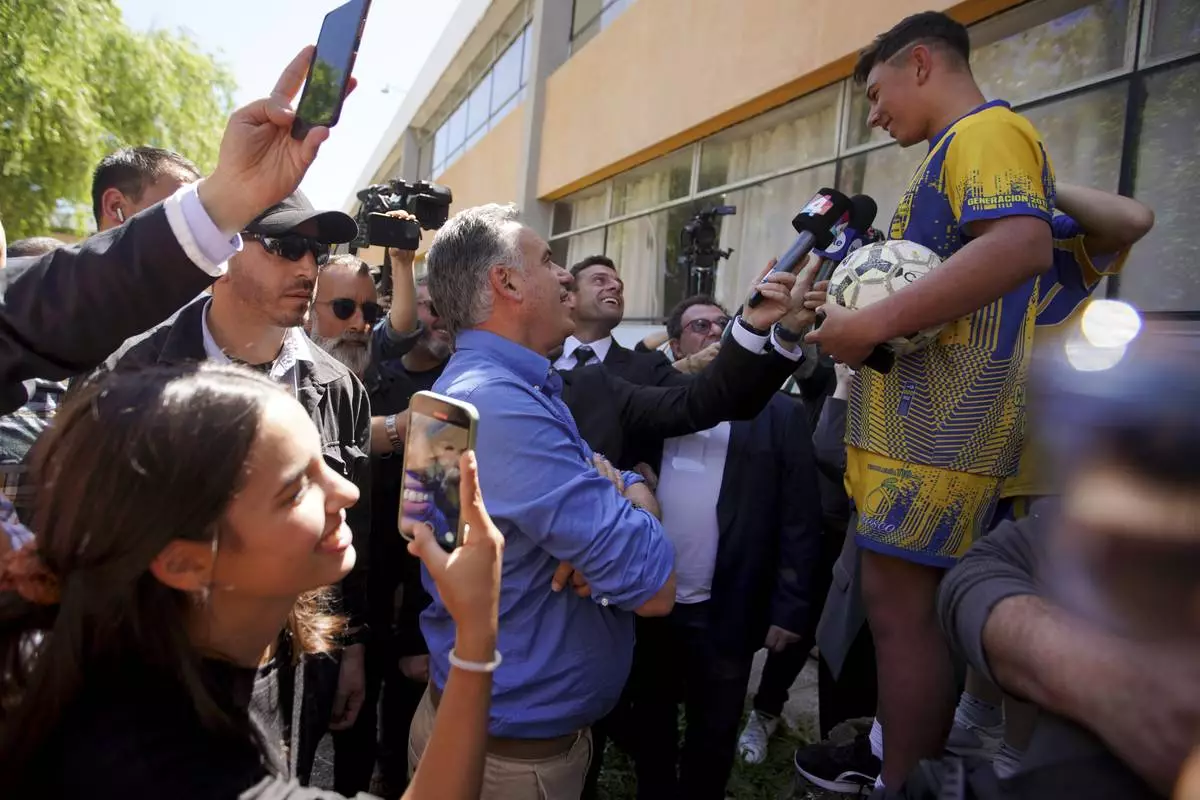
Frente Amplio presidential candidate Yamandu Orsi, center, talks to a youth after voting in general elections in Canelones, Uruguay, Sunday, Oct. 27, 2024. (AP Photo/Matilde Campodonico)
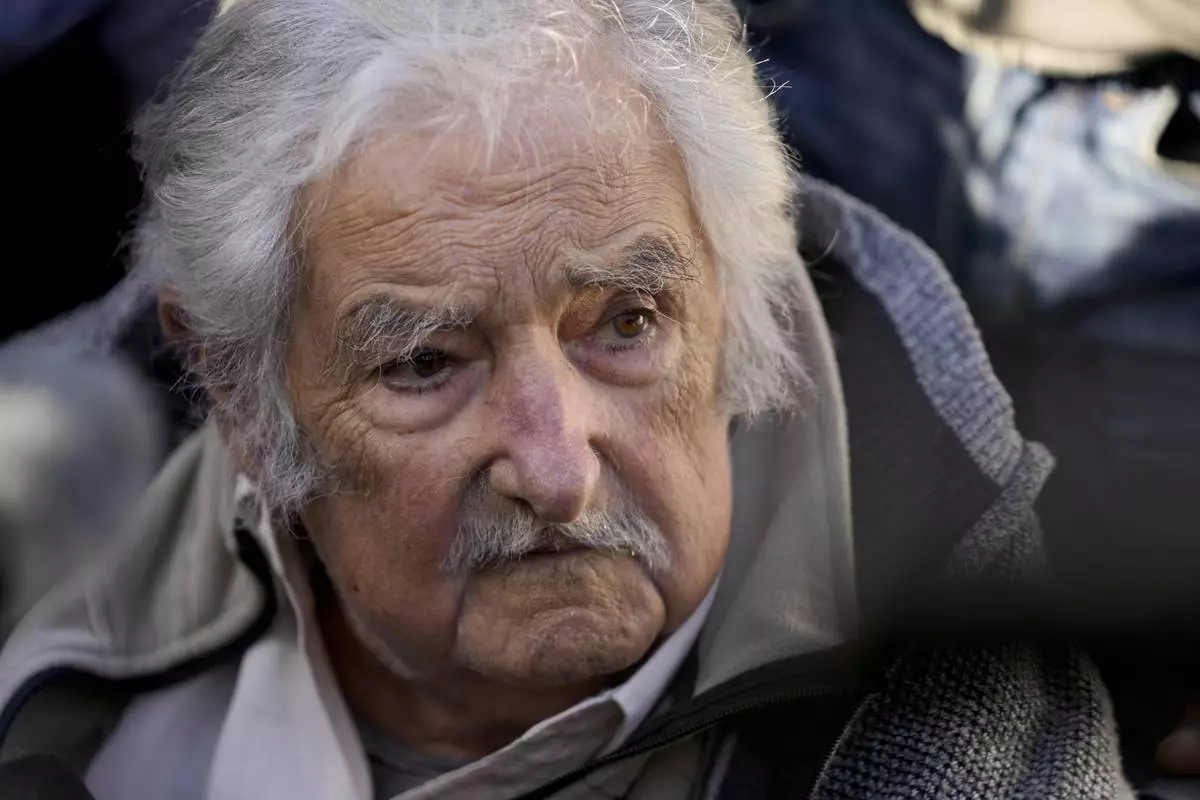
Former Uruguayan President Jose "Pepe" Mujica talks to journalists after voting at a polling station during general elections in Montevideo, Uruguay, Sunday, Oct. 27, 2024. (AP Photo/Natacha Pisarenko)
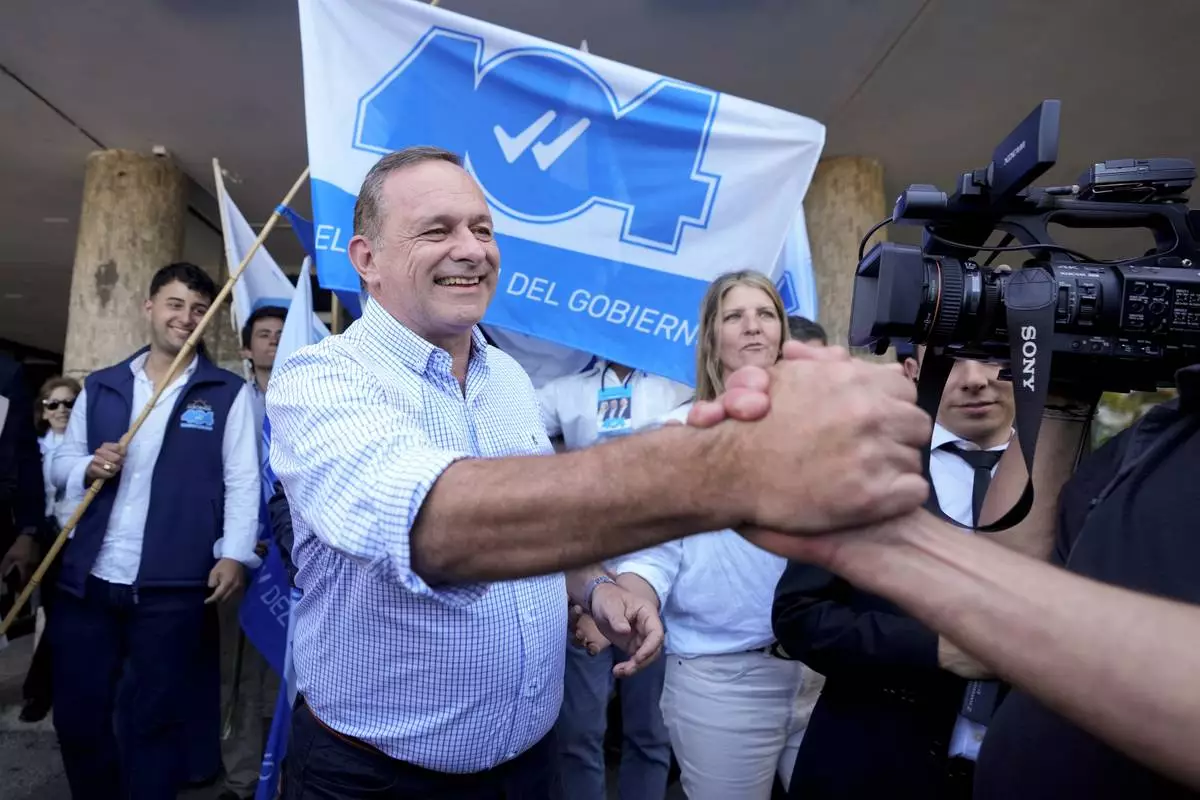
Alvaro Delgado, presidential candidate for the ruling National Party, center, greets a supporter outside a polling station during general elections in Montevideo, Uruguay, Sunday, Oct. 27, 2024. (AP Photo/Natacha Pisarenko)
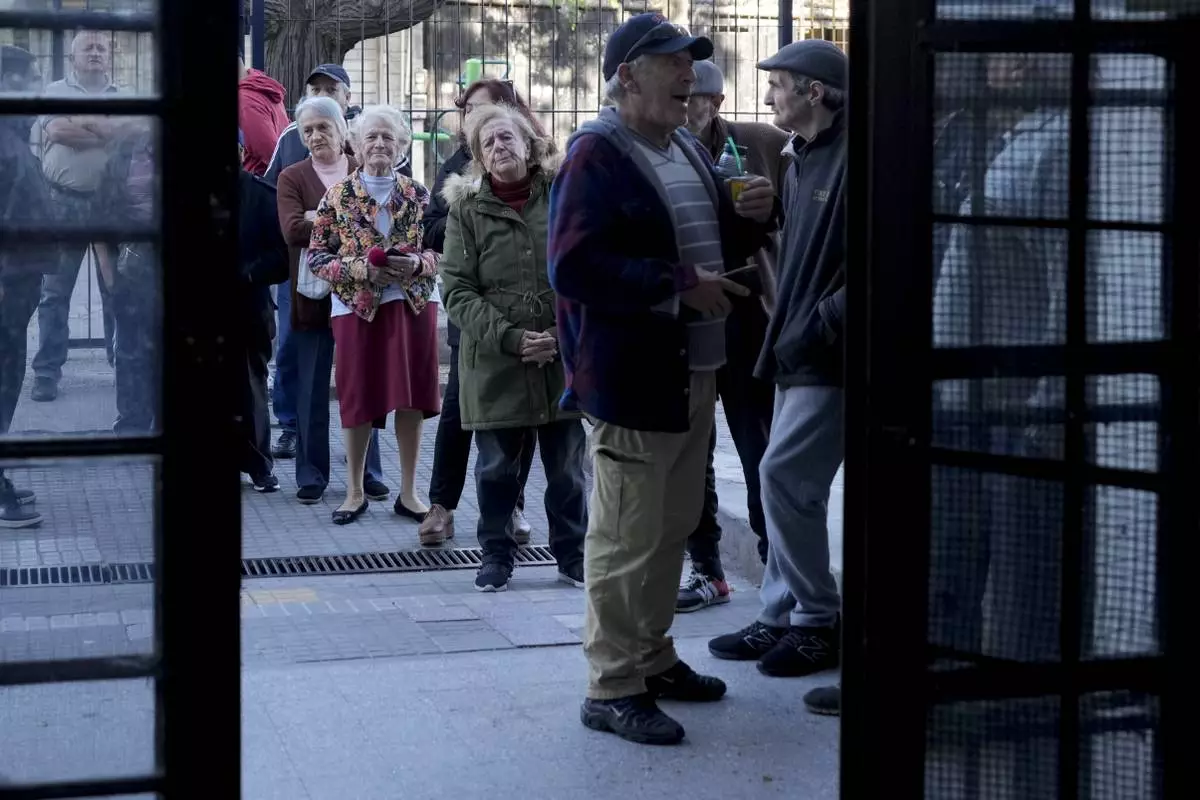
People line up to vote outside a polling station during general elections in Montevideo, Uruguay, Sunday, Oct. 27, 2024. (AP Photo/Natacha Pisarenko)
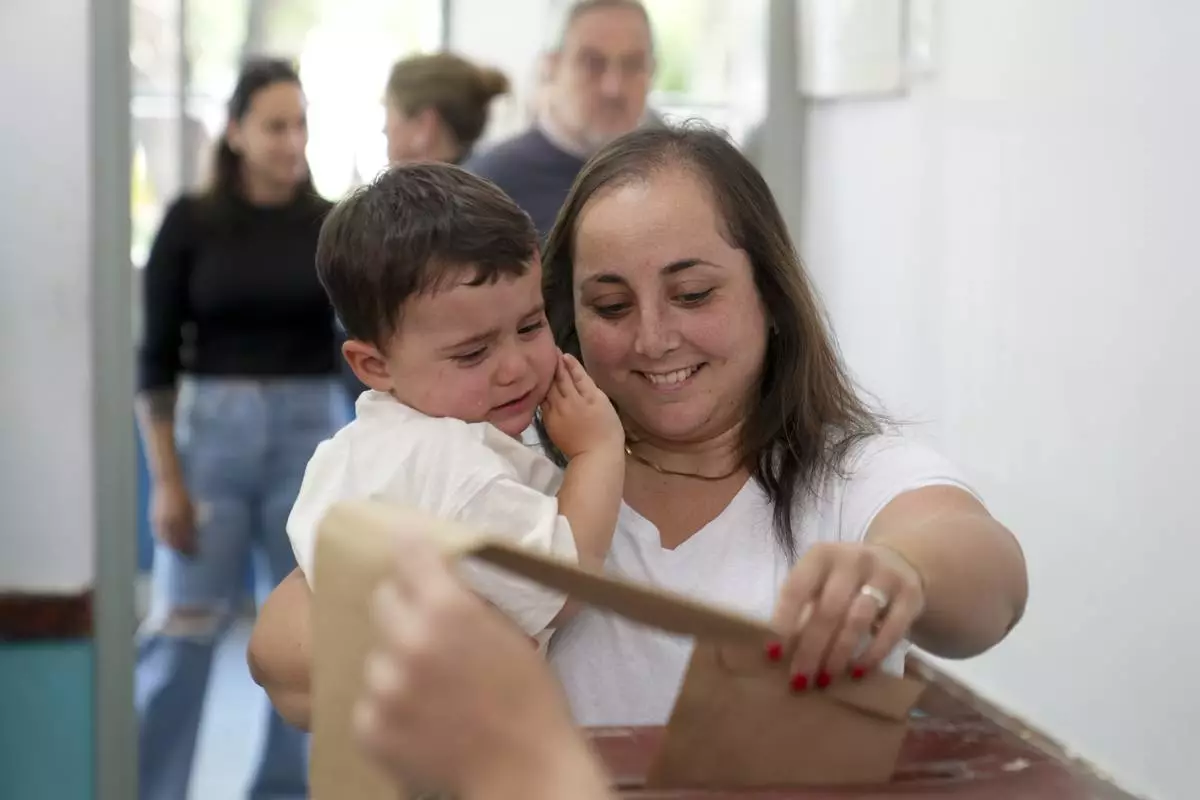
A woman votes during general elections in Canelones, Uruguay, Sunday, Oct. 27, 2024. (AP Photo/Matilde Campodonico)
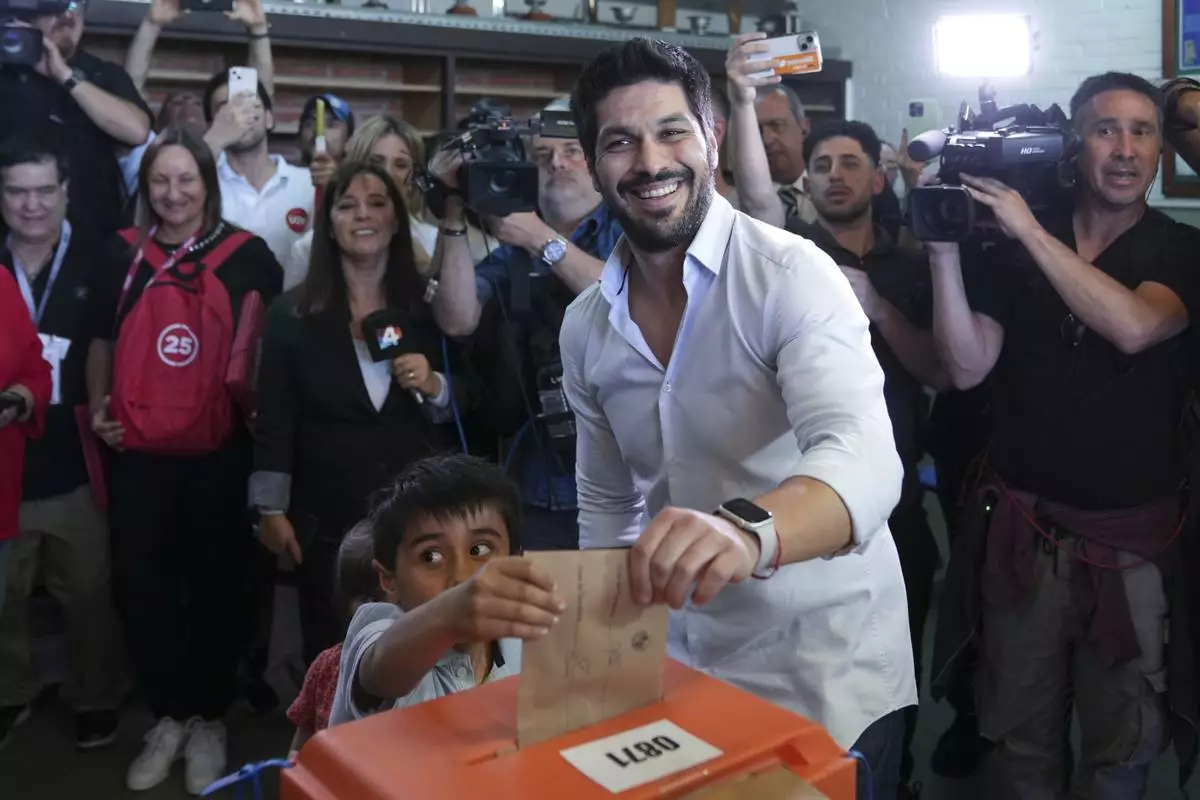
Andres Ojeda, Colorado Party presidential candidate, votes alongside his nephew at a polling station during general elections in Montevideo, Uruguay, Sunday, Oct. 27, 2024. (AP Photo/Matilde Campodonico)
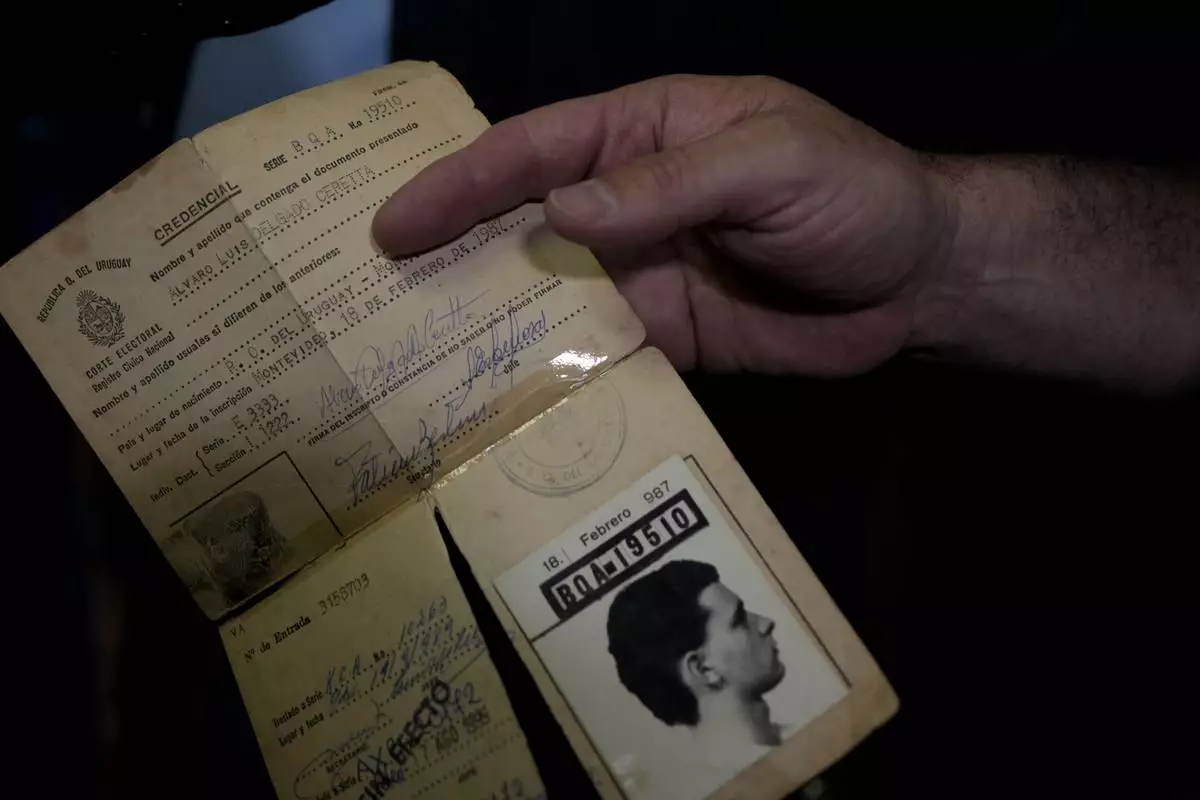
Alvaro Delgado, presidential candidate for the ruling National Party, holds out his voting document at a polling station during general elections in Montevideo, Uruguay, Sunday, Oct. 27, 2024. (AP Photo/Natacha Pisarenko)
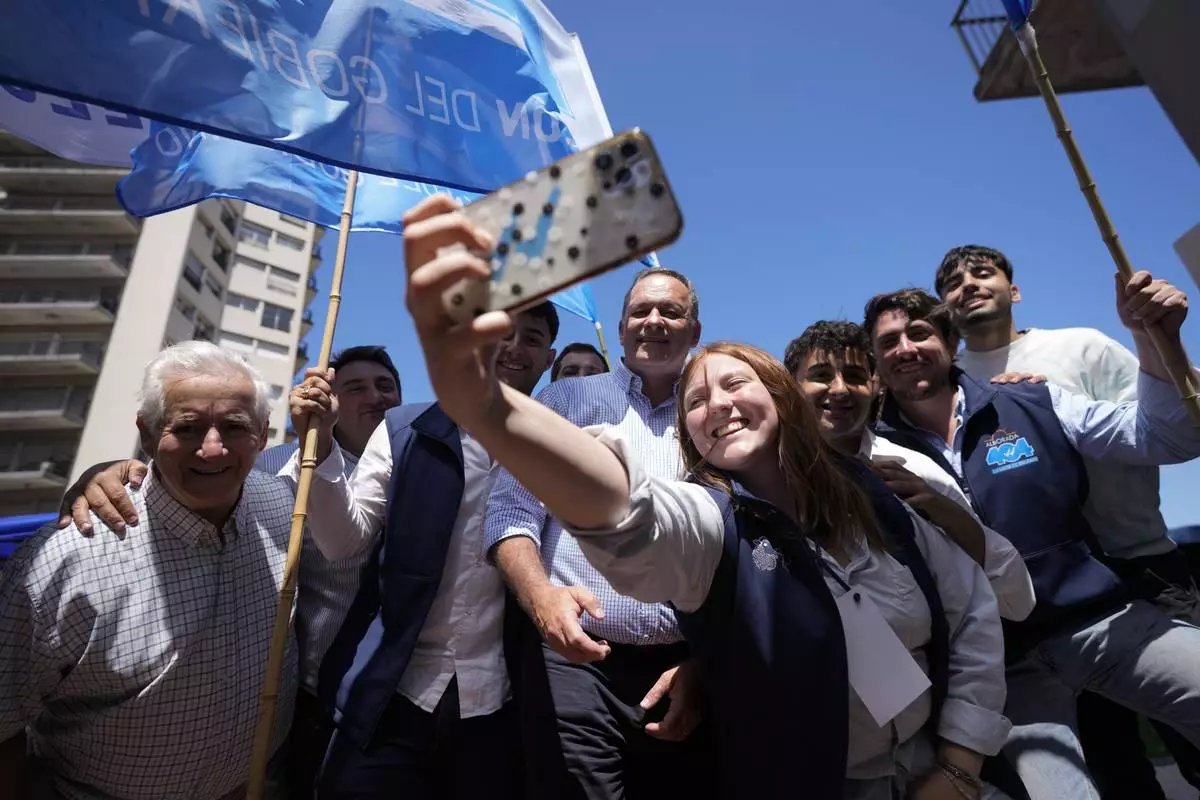
Alvaro Delgado, presidential candidate for the ruling National Party, center, poses for a selfie with supporters outside a polling station during general elections in Montevideo, Uruguay, Sunday, Oct. 27, 2024. (AP Photo/Natacha Pisarenko)
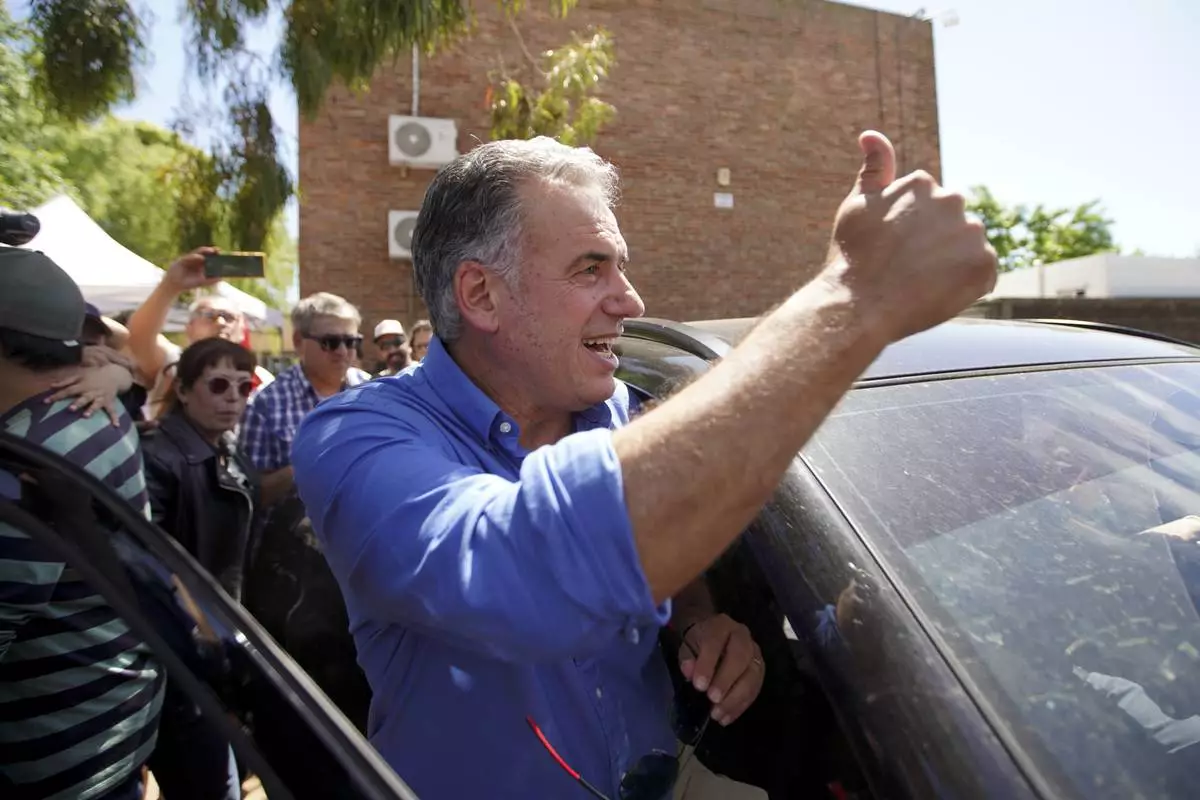
Frente Amplio presidential candidate Yamandu Orsi gets into a car after voting during general elections in Canelones, Uruguay, Sunday, Oct. 27, 2024. (AP Photo/Matilde Campodonico)
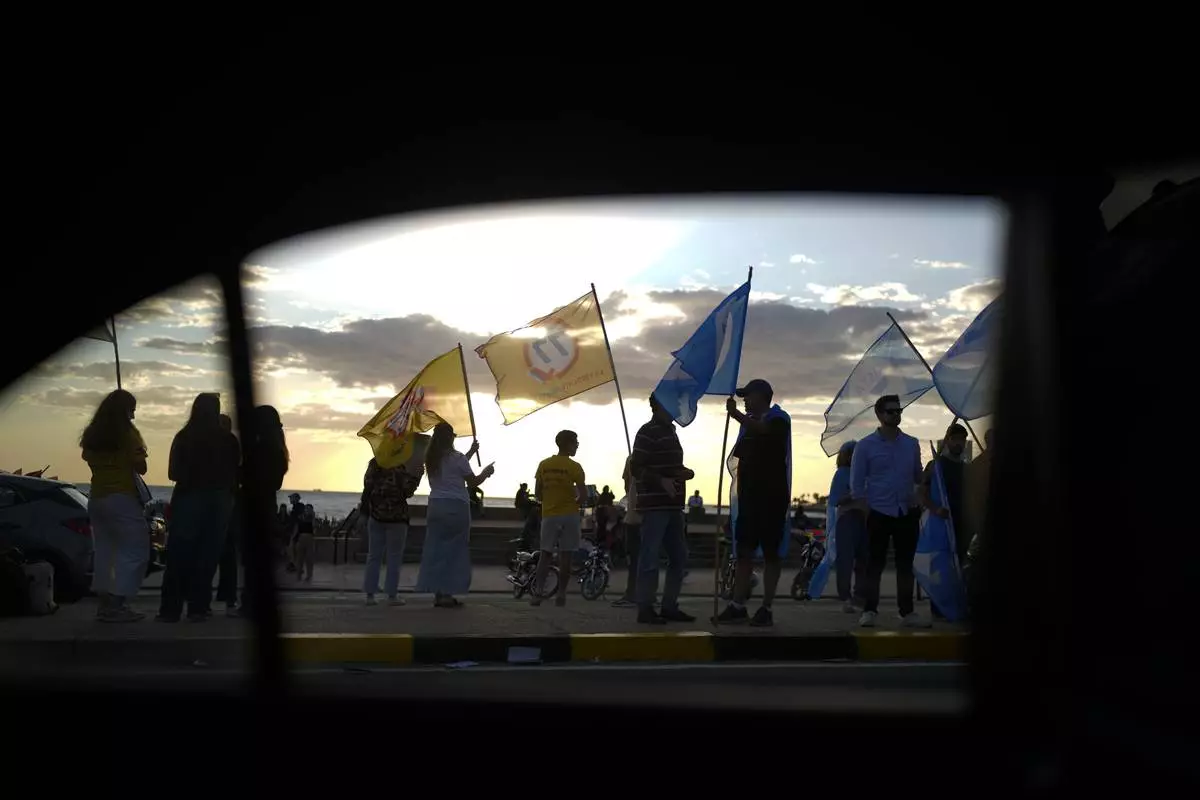
Political party members rally a day ahead of the general election, in Montevideo, Uruguay, Saturday, Oct. 26, 2024. (AP Photo/Natacha Pisarenko)
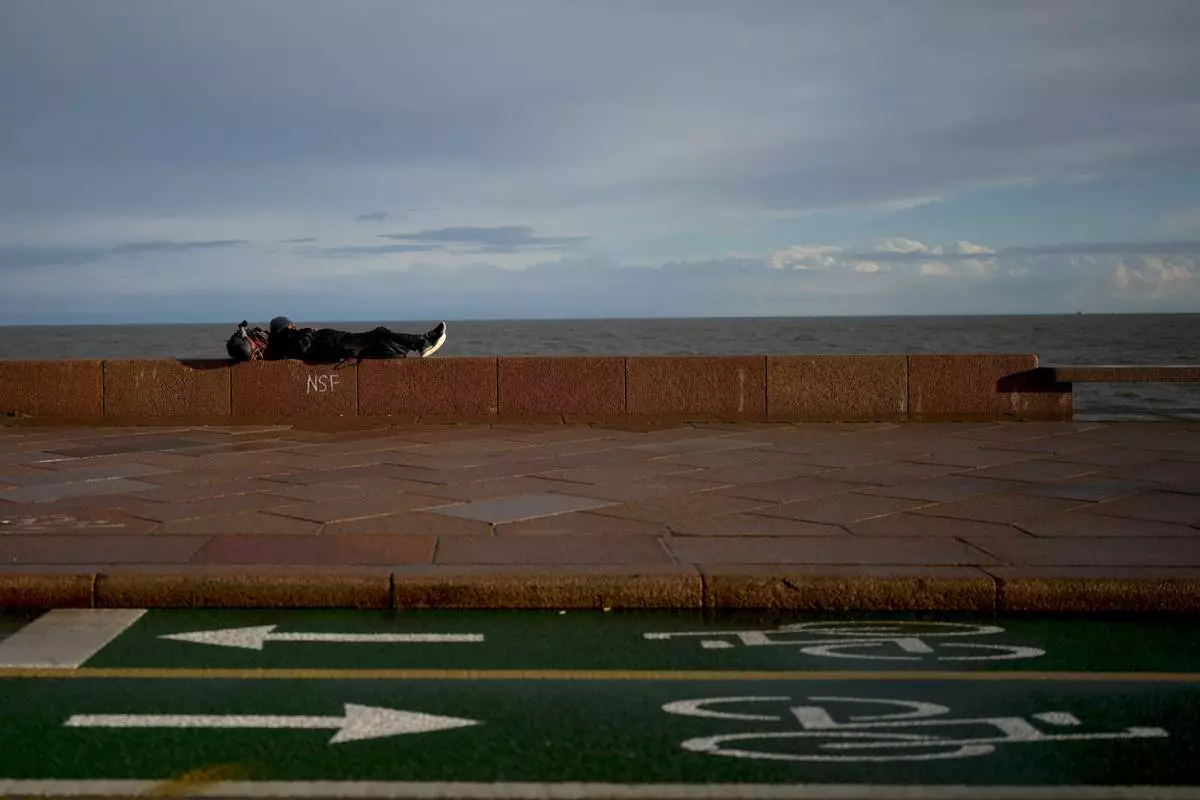
A man rests the wall of a promenade ahead of Sunday's general election, in Montevideo, Uruguay, Friday, Oct. 25, 2024. (AP Photo/Natacha Pisarenko)
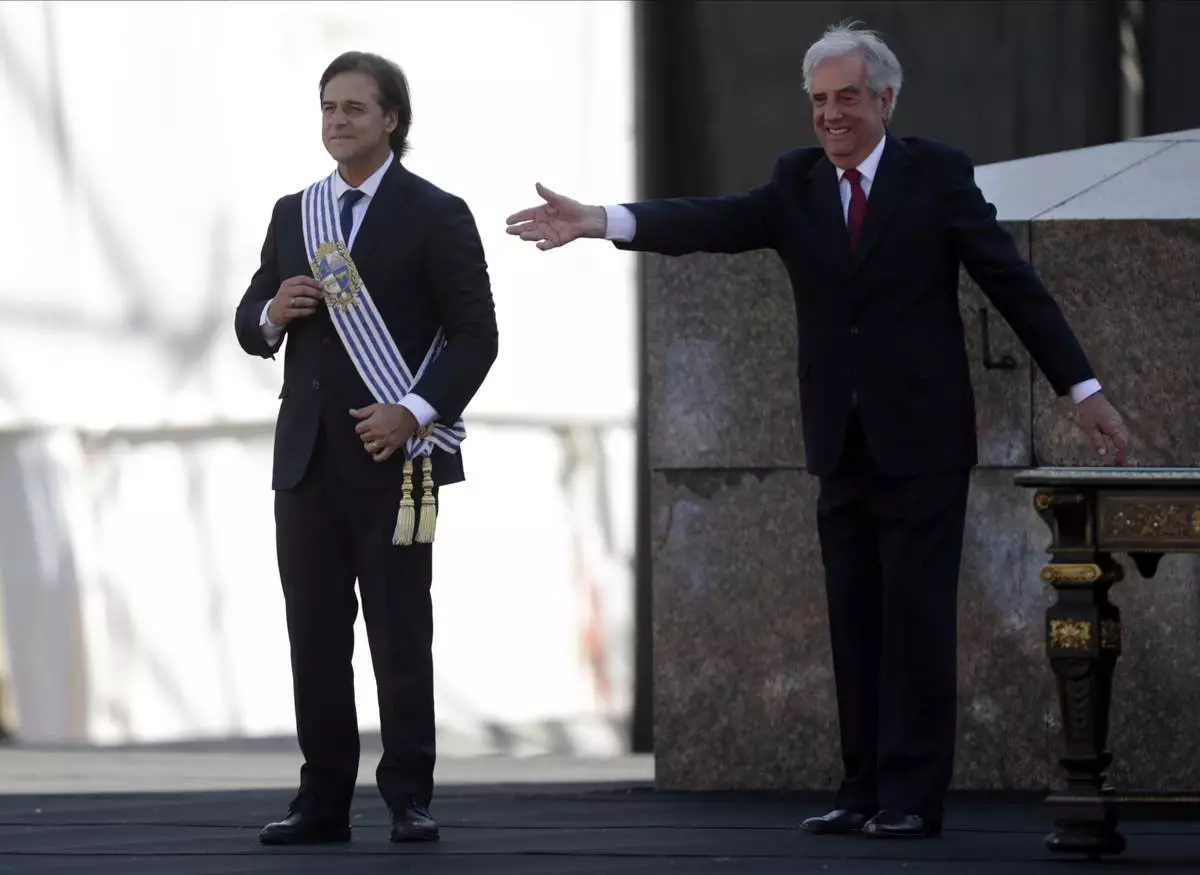
FILE - Uruguay's President Luis Lacalle Pou smiles after receiving the presidential sash from outgoing President Tabare Vazquez, in Montevideo, Uruguay, March 1, 2020. (AP Photo/Matilde Campodonico, File)
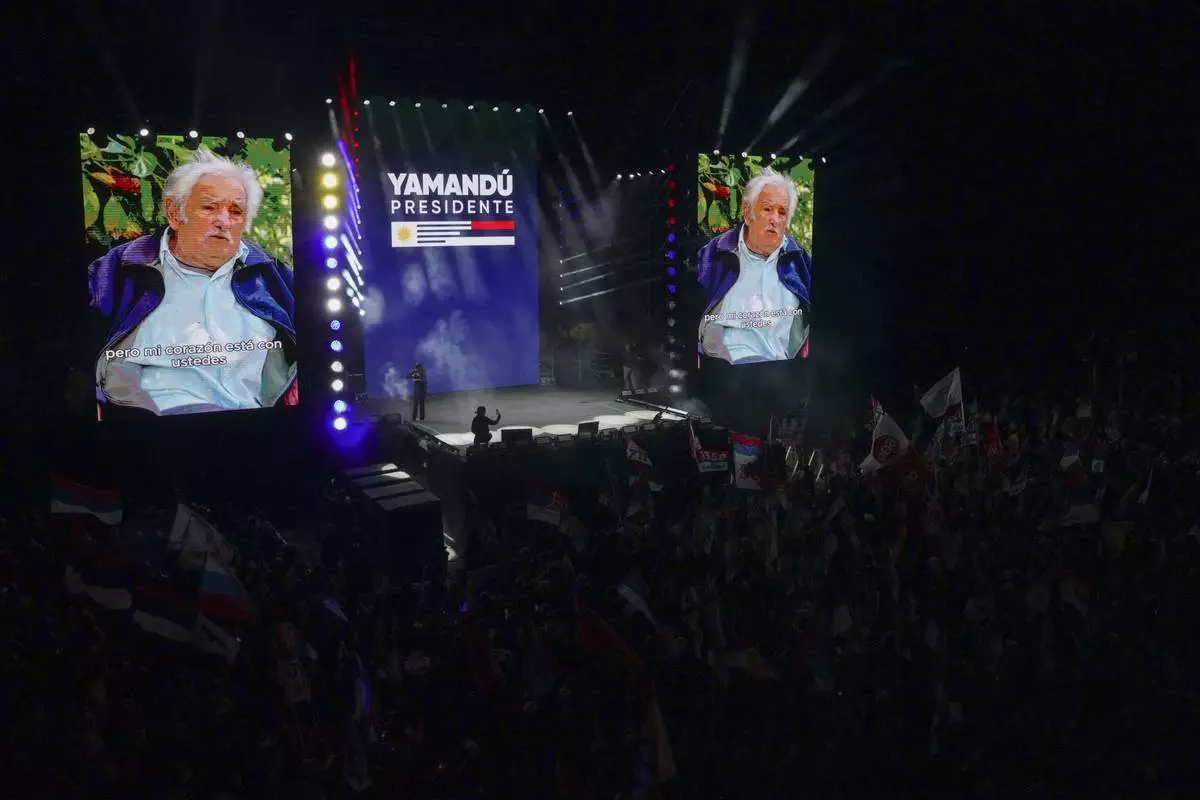
A screen shows former President Jose Mujica delivering a message during a rally for Frente Amplio presidential candidate Yamandu Orsi five days ahead of elections in Montevideo, Uruguay, Tuesday, Oct. 22, 2024. (AP Photo/Matilde Campodonico)
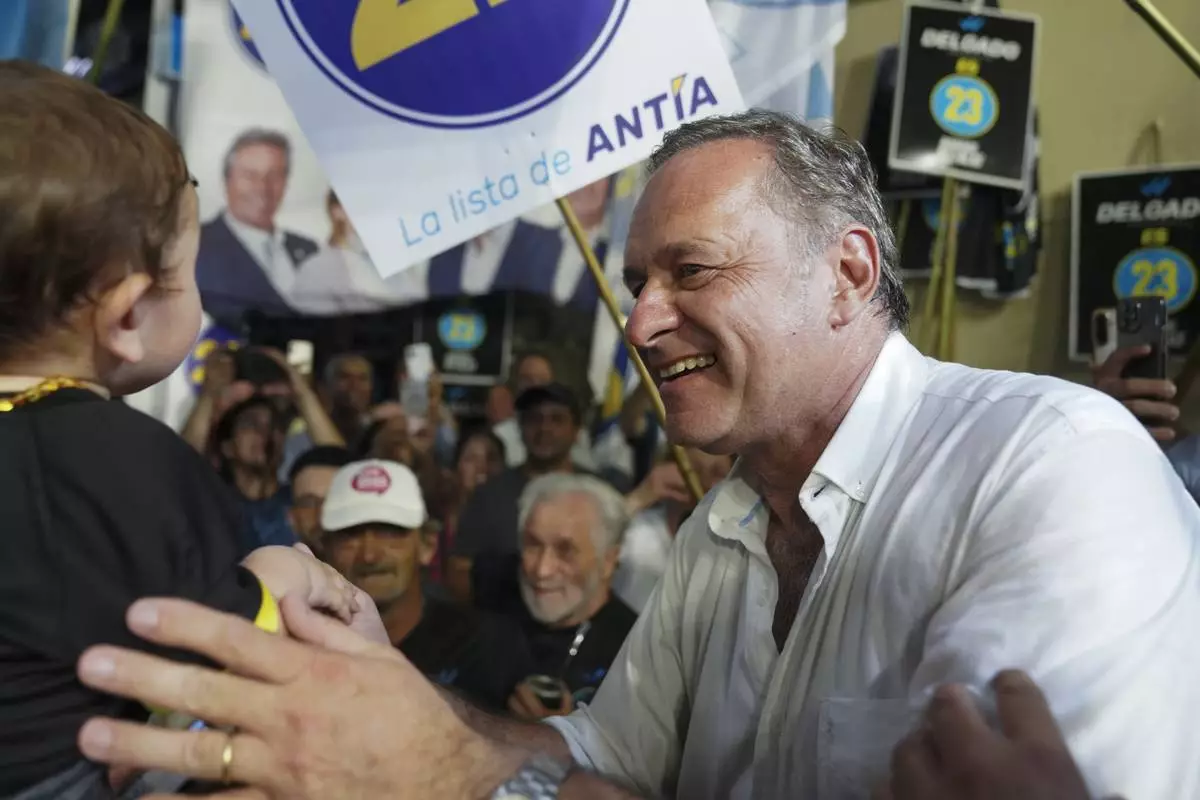
Alvaro Delgado, presidential candidate for the ruling National Party, smiles at a rally six days ahead of presidential elections, in Maldonado, Uruguay, Monday, Oct. 21, 2024. (AP Photo/Matilde Campodonico)
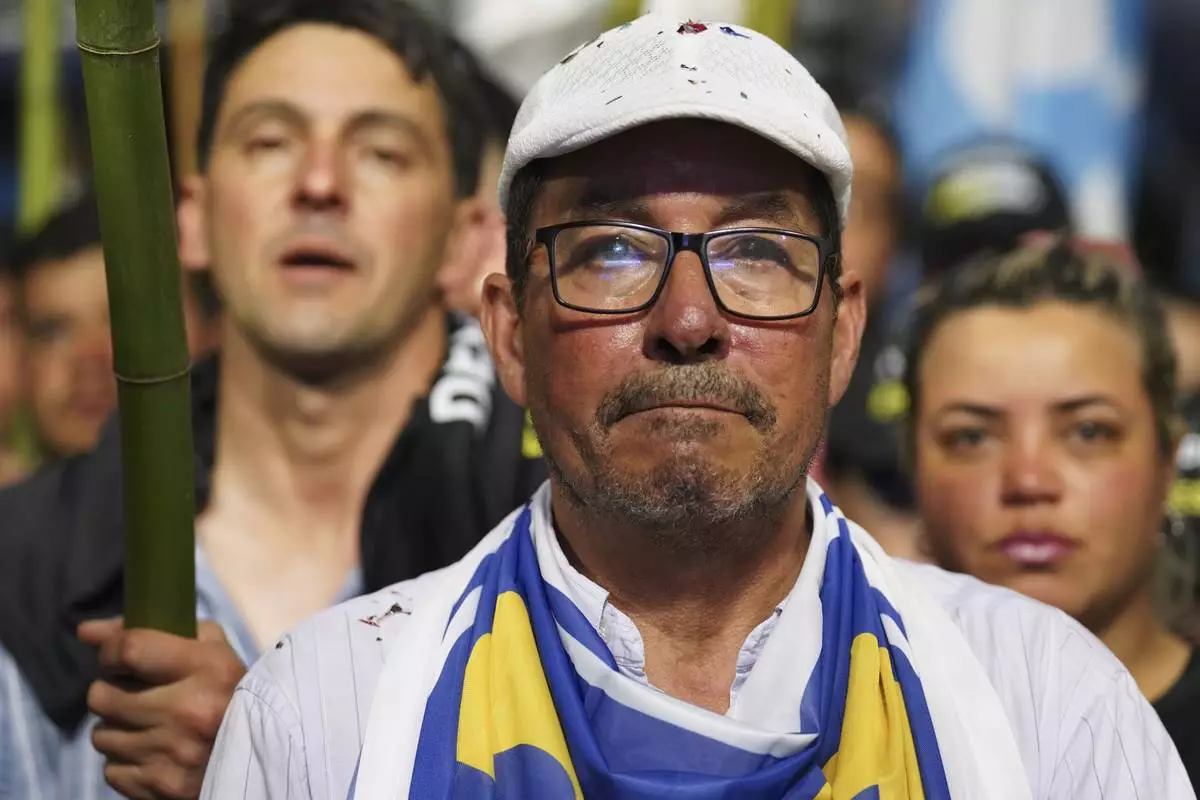
A supporter of Alvaro Delgado, presidential candidate for the ruling National Party, attends a rally six days ahead of presidential elections, in Maldonado, Uruguay, Monday, Oct. 21, 2024. (AP Photo/Matilde Campodonico)
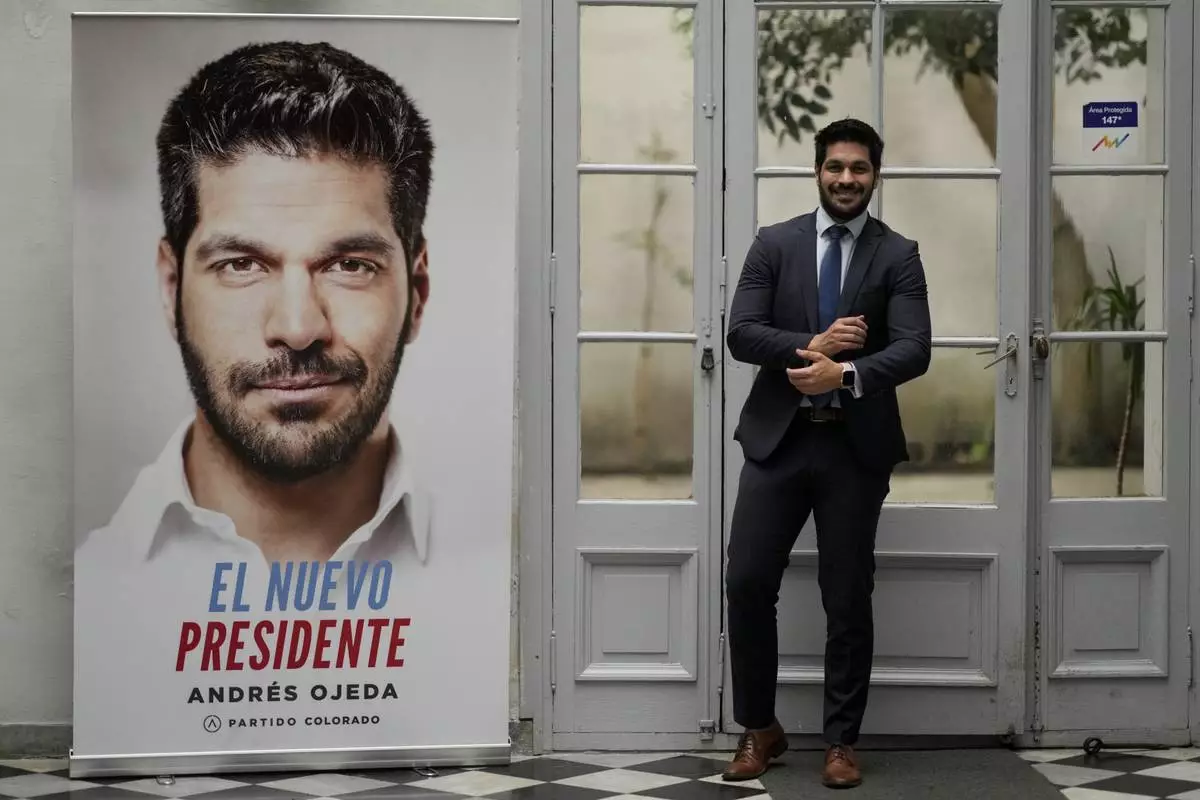
Andres Ojeda, Colorado Party presidential candidate, poses for a photo alongside one of his campaign banners, ahead of Sunday's upcoming general election, in Montevideo, Uruguay, Friday, Oct. 25, 2024. (AP Photo/Natacha Pisarenko)
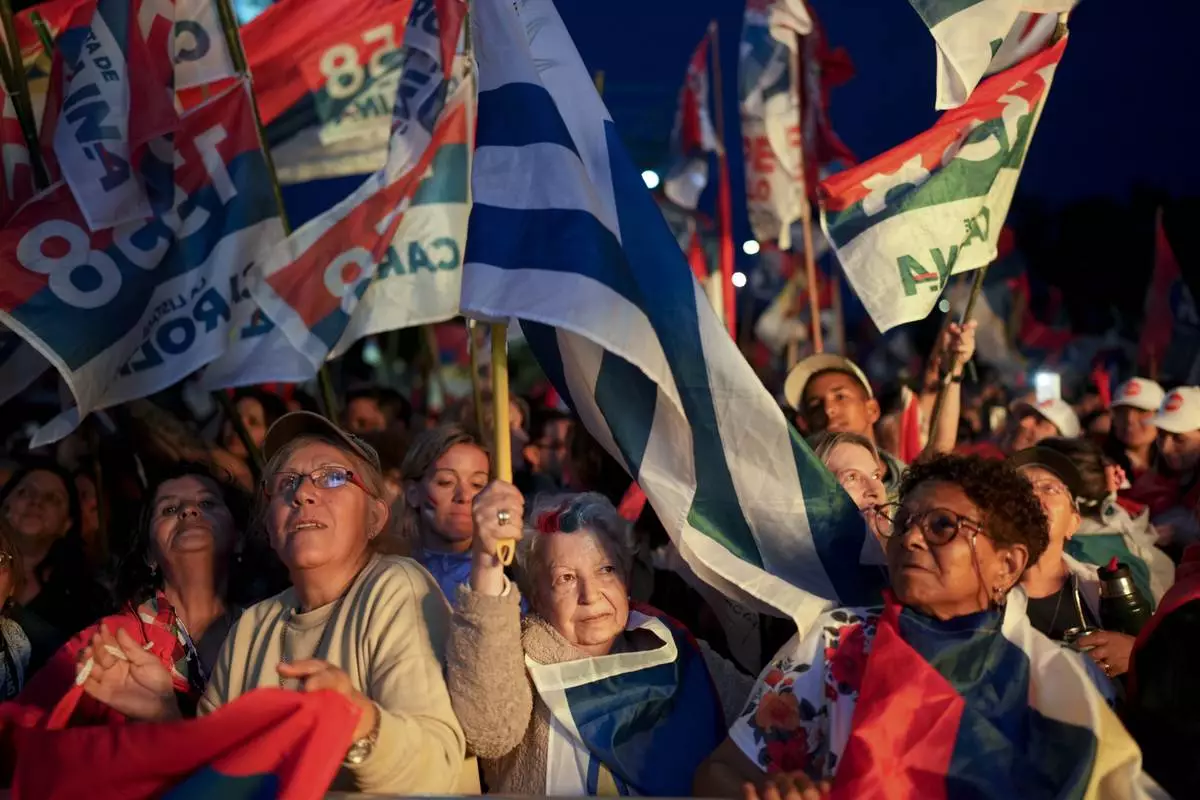
Supporters of Frente Amplio presidential candidate Yamandu Orsi attend a rally five days ahead of elections in Montevideo, Uruguay, Tuesday, Oct. 22, 2024. (AP Photo/Matilde Campodonico)
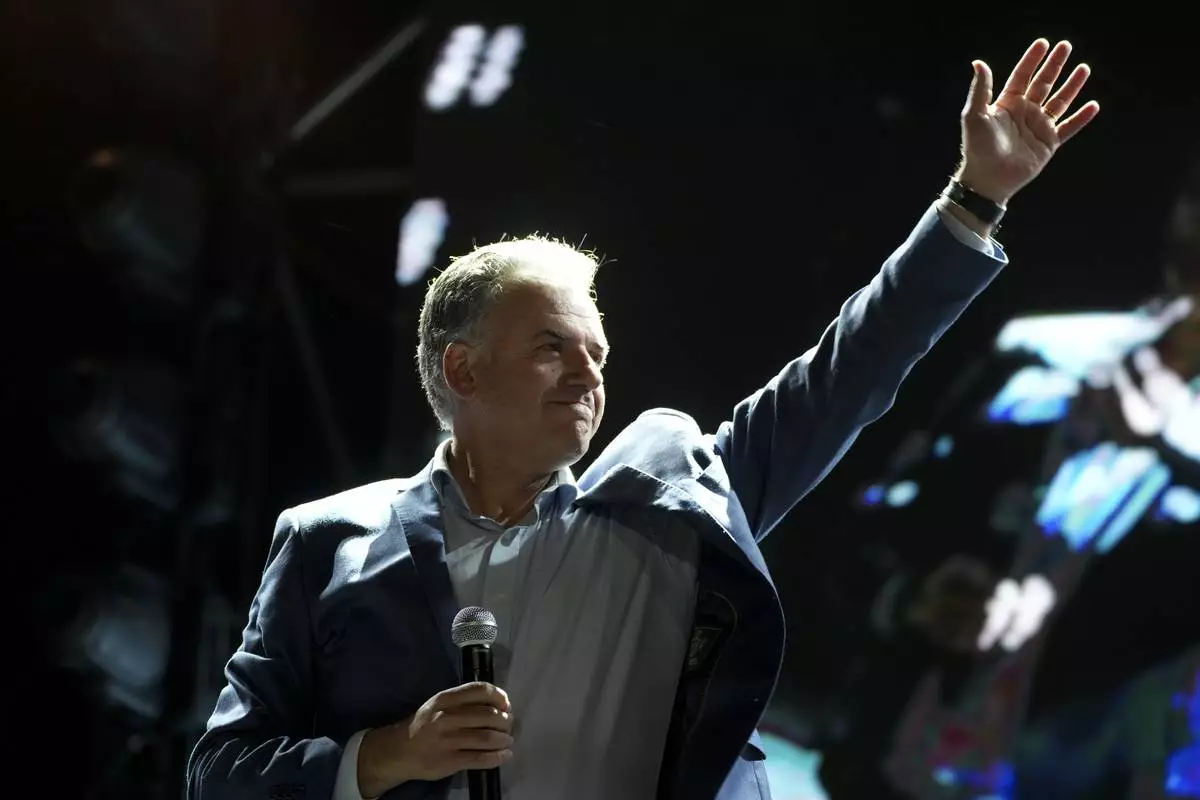
Frente Amplio presidential candidate Yamandu Orsi waves to supporters during a rally five days ahead of elections in Montevideo, Uruguay, Tuesday, Oct. 22, 2024. (AP Photo/Matilde Campodonico)
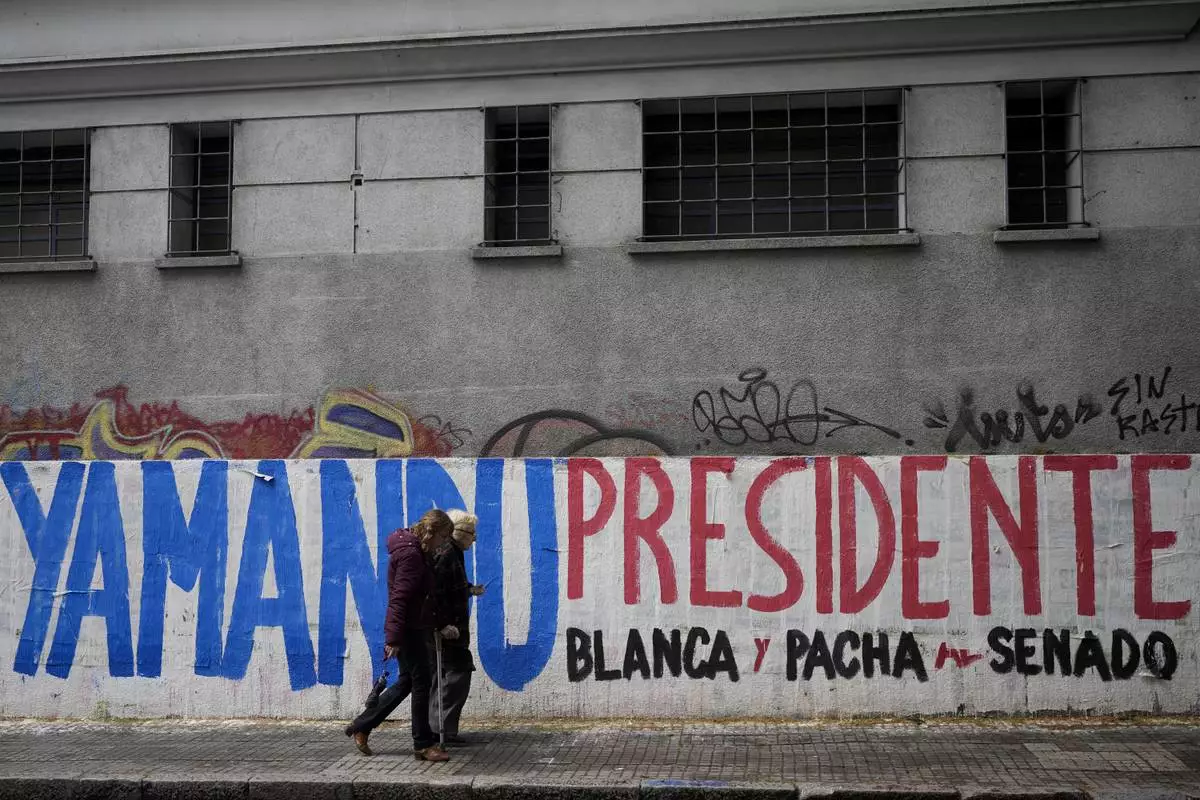
Pedestrians walk past a campaign mural promoting Frente Amplio presidential candidate Yamandu Orsi, ahead of Sunday's upcoming general election, in Montevideo, Uruguay, Friday, Oct. 25, 2024. (AP Photo/Natacha Pisarenko)

A supporter of Frente Amplio presidential candidate Yamandu Orsi attends a rally five days ahead of elections in Montevideo, Uruguay, Tuesday, Oct. 22, 2024. (AP Photo/Matilde Campodonico)




